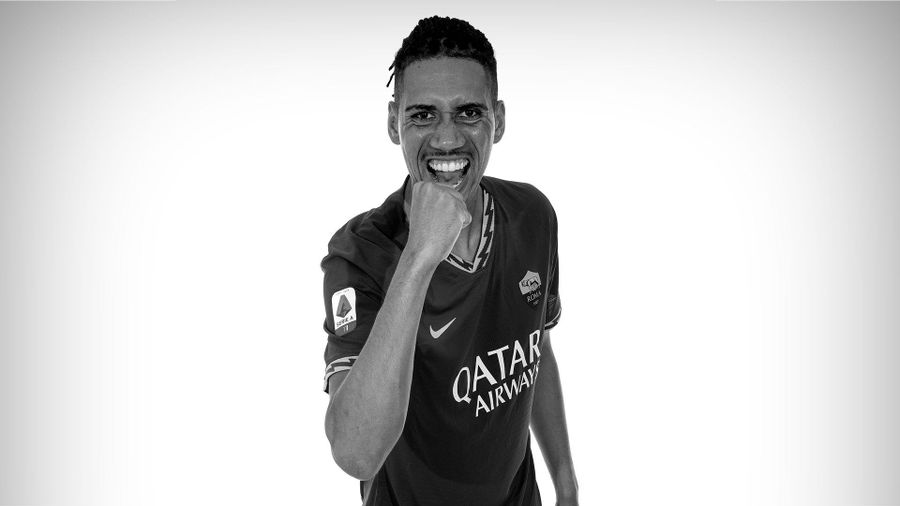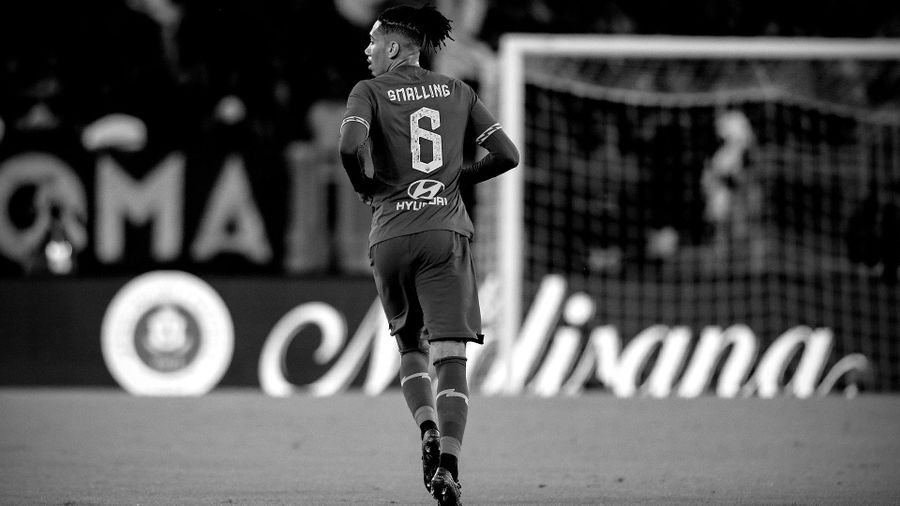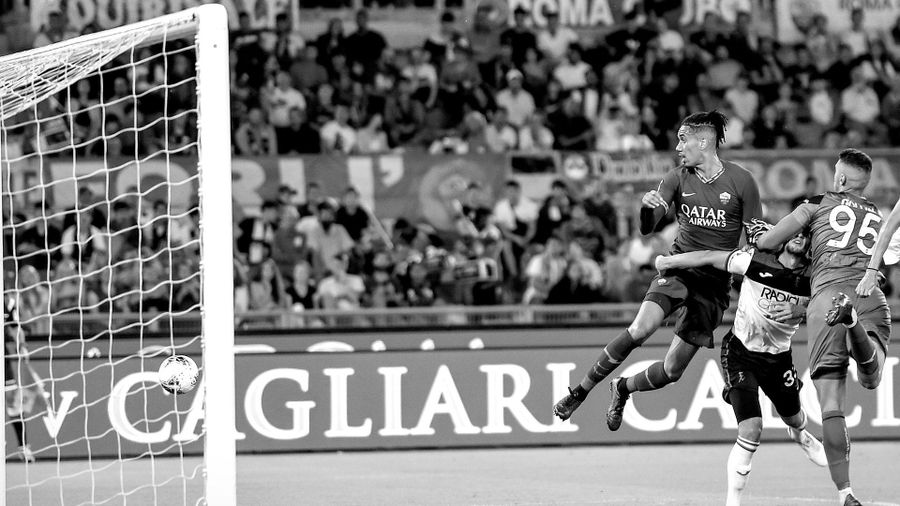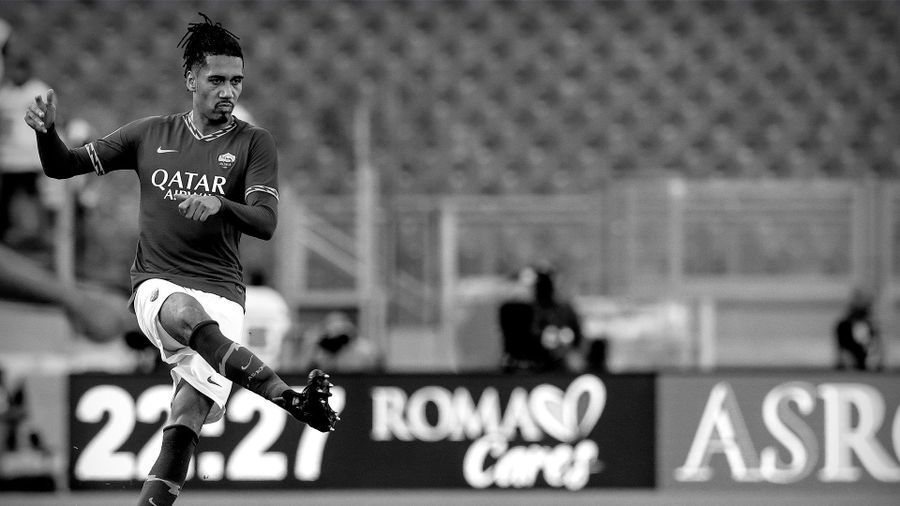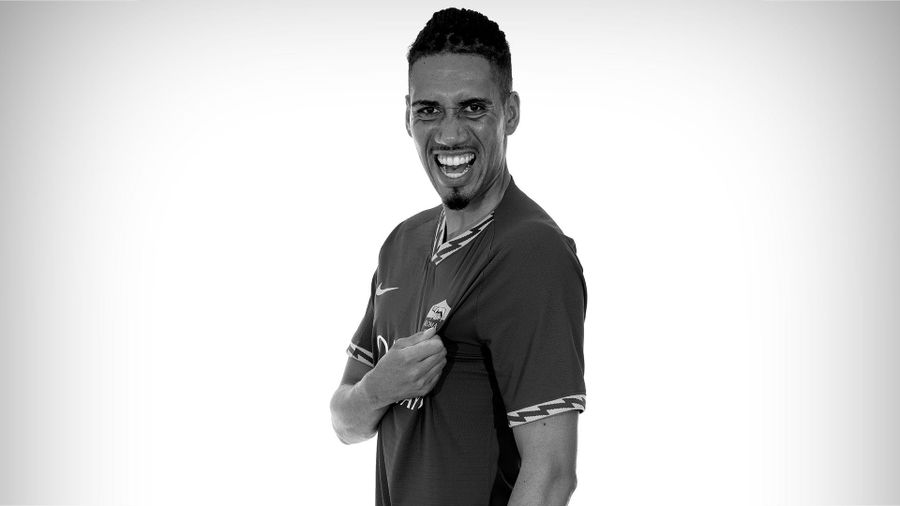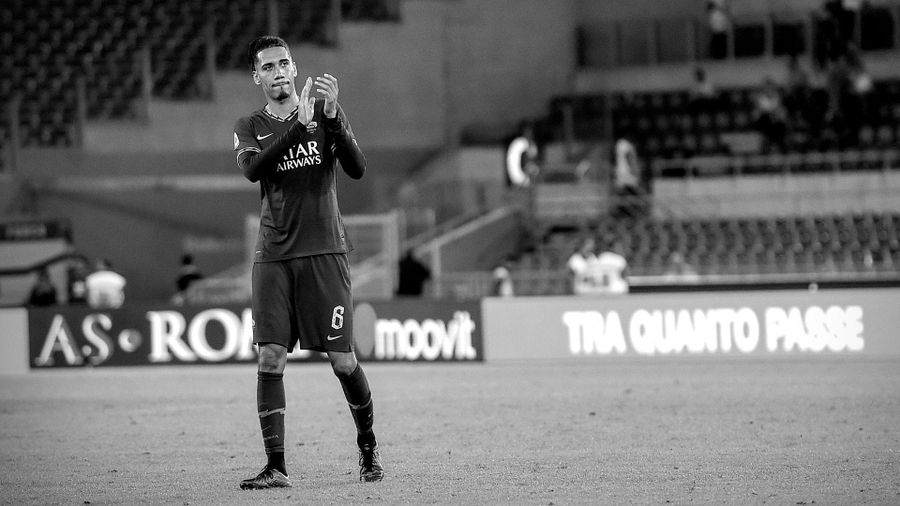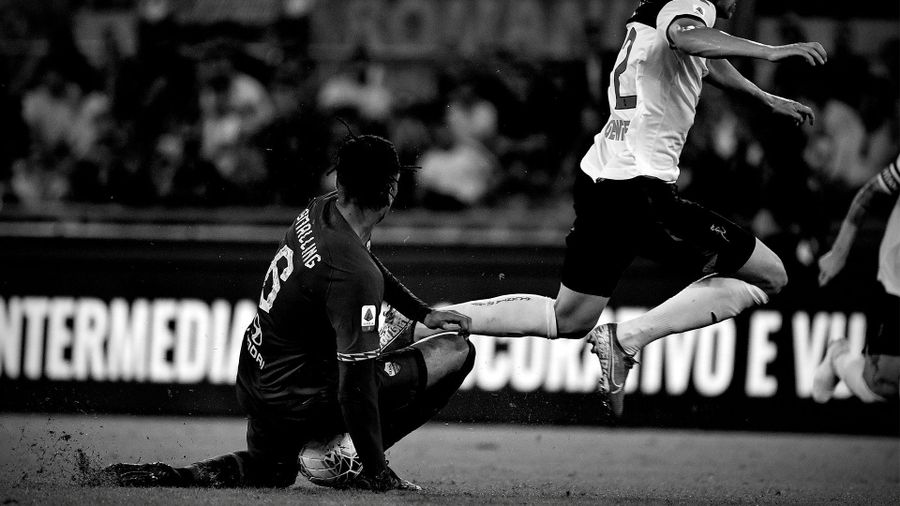
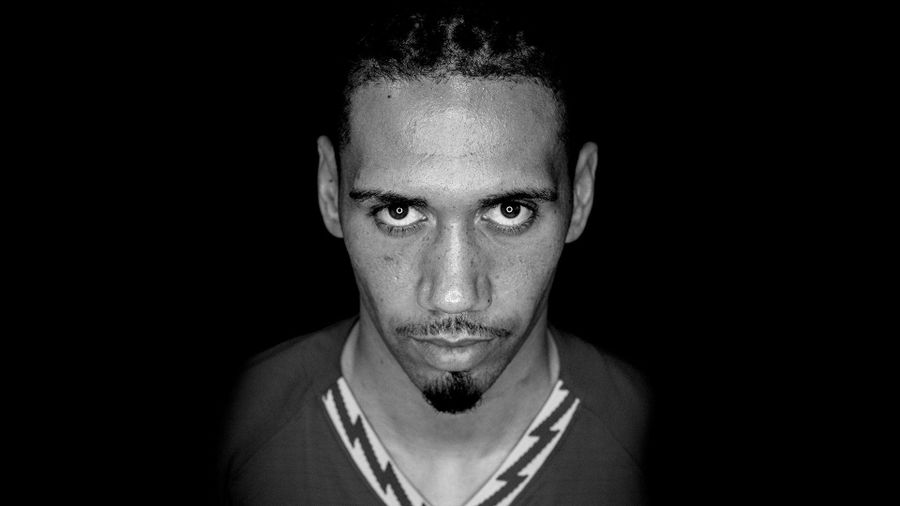
Chris Smalling is enjoying a new adventure in Rome - and savouring every minute of it.
After a summer of contemplation and consideration, working out exactly what he wanted to achieve this season, he made the decision to come to AS Roma - and help the club in its bid to reach all its targets for the current campaign.
An Englishman in Serie A has been a fairly rare sight in recent times; we sat down with the centre-back to discuss the move, first and foremost, but to reflect on so much more besides - including the tough start to his career, his rapid rise from non-league football to Premier League glory, and his growth as both a player and a person in recent years.
Chris, let’s start from the very start. What are your first memories playing football?
“My first memory is of football is probably me and my brother playing in the garden. But my mum soon signed us up to a team that was just up the road from us, Walderslade Boys, and we were probably in the Under-7s then. That might be my first real memories. I played for them until probably Under-12s or Under-13s. I was very lucky to have a team on our doorstep, and mum signed us up straight away. That’s how it all got started.”
Were you always passionate about football? From as soon as you were really aware of it?
“Definitely yeah, for both me and my brother. We would play all sports – rugby, cricket, athletics – and then the chance to join a club and play football, the sport we probably loved the most of all, and to be in a proper team, with the full kit and everything else, we were just so excited and couldn’t wait for the weekend. We loved it.”
How did your junior career progress? Were you picked up by a professional team’s academy?
“Yes, I was playing for Walderslade Boys and also for my school, and I think it was Year Six – so when I was about 11 – that my teacher put me forward for Kent county trials, to play for the county team. And I managed to get into that team. So there were a few scouts watching that team closely and as that season went on I got picked up by Millwall. So I joined them and I stayed with them until I was about 15 or 16.
"So, yeah, that was the first time I was really noticed by a professional team. Through playing for the county, and thanks to my school teacher pushing me – and he actually took me to the trials too, because my mum did not have a driving licence. So I was fortunate to get that additional help.”
Were you aware, even before those trials, that you were really good?
“I think I felt like in terms of my local team and school, I felt like I was I was one of the better ones there. But when you are that young and you go it’s almost like, you definitely don’t put too much pressure and expectation on yourself – it’s just another chance to play more football. So going into it all feeling quite relaxed and not having too much pressure, I think that definitely helps you show what you are about a bit more.”
How was the experience of being in the Millwall academy?
“It was an amazing experience, just to go from maybe training and playing once a week to then training two, three times a week with other really good young players. But at the time my mum didn’t drive – so I would have to miss some training session. It was quite far away from our house at the time so it was difficult to make every training session, so sometimes I had to train with boys one or two age groups up because those were the sessions on a day I could make it. Obviously that was difficult and it pushed you a lot, especially as I wasn’t really developing physically so quickly at that time, but I think I learned quite a lot from it too. But it was definitely quite tough. At times it was difficult, but I think it made me stronger in the long run by playing alongside older kids.”
Now you can look back at it as something that helped you, but at the time it sounds like it must have been incredibly frustrating.
“Yeah, it was a struggle, I think. Because you just want to one train on all the days your teammates do – but then you are missing some. And they are developing at a continuous pace and you really want to keep up with them. So at the time it felt like I was missing out. And then, obviously, when I left there it was because I was released because I was not really developing as quickly. So it felt like a real missed opportunity. But that’s when I went to play for a local team, and focused on enjoying football.”
By the end, were you expecting to be released?
“I probably was, actually, because I was missing so many more training sessions. It was more of a case of trying to find something a bit closer to home, because the travelling was not getting any easier. I was getting a lot of lifts to training from one teammate who lived near me, but then he got injured – so he wasn’t travelling so much and I could not rely on that option anymore. So it was far from ideal. At the time, I definitely was really gutted and felt like it was an opportunity I had missed.”
Then what? You go back to playing for a local club and for your school?
“So, I was continually playing for the county team, which I was getting into regularly and enjoying. And then I joined Maidstone United, which would have been the Under-16s, I think. I quickly started playing for the Under-18s and then the reserves, and it wasn’t long before I was involved with the first team. That was my first taste of senior football.
"Another big thing was I got the chance to have a trial for England Schoolboys too. And I managed to get selected for that, which was another point where there were a lot of scouts watching – because obviously all the kids with England Schoolboys are at non-professional clubs, so scouts are always thinking there might be one or two interesting players there. So that helped. And then I managed to play a few games for Maidstone that season. So it was quite a lot of progress – and a big step up to men’s football. I was a pretty skinny kid, then. I definitely took a few knocks – I think a few strikers saw an opportunity with me. But it was great for my development.”
Was that always the plan when you signed for Maidstone? Or was it just the best option to continue playing within a more organised setup?
“Yeah, it was the latter really, at the time. I was going in to sixth form then, so I was probably more focused on going to university. So in terms of my football it was a good fit to train two or three times a week with a semi-professional team, see how I fitted in with it all and how I enjoyed it and how it tested me. But I was much more focused on making sure I finished my A-levels. But I loved the game and it was a great challenge for me too.”
Were you even getting paid?
“I was playing for the Under-18s at the start and then the reserves. Even when I started to break into the first team I was probably still paying my subs at that stage, I think! The season after I was regularly with the first team, but I don’t really remember getting paid to be honest – I think I still didn’t have a proper contract at that point. Maybe if I had stayed the season after we would have sorted something out.”
In these interviews we often ask if the player always thought they would be a professional. Lots say they did – but it sounds like maybe at this point you didn’t see that as a realistic target? Did that possibility seem to have come and gone a bit?
“I think maybe when I was a lot younger, playing for the county and had just signed for Millwall, then being a professional was a realistic goal I had. But obviously getting released started to make me question that. Because there were so many good players in so many of the different age group teams, and maybe if you are lucky one or two of those would make it all the way. And that realisation definitely started to dawn on me.
"And even when I was at Maidstone, and playing for England Schoolboys, I was thinking more about universities – I want to go here, I’m going to study this. I was focused on doing well at school. And then as my final exams came up I got invited to a couple of trials. Even then I didn’t really get ahead of myself, it was more of a case of being sure I had my A-levels sorted and my grades and then I’ll go to the trials and just see what happens.
"I think that gave me a carefree attitude, and knowing I had something else lined up meant I didn’t put too much pressure on myself. If that hadn’t been the case, if it had been everything, I would probably have been too nervous. But it was more a case of, ‘Let’s go for it!’. If it happens it happens, and then I’ve got a decision to make.”
So if those trials had come six or nine months later, maybe you would have already gone to university?
“Yeah - because I had them that summer. I was already going to start university probably two months after. So that was really the only time to do them. The schoolboys season was coming to an end, and that’s when the trial periods were. So I would probably have gone to uni and then joined a decent team nearby. That was my focus. So yeah, the timing was pretty critical.”
And then the trials gave you two options…
“Yeah, in the end, both of them I got through. I was very lucky with Middlesbrough, I went there and loved it and wanted to be there. My brother and my mother came and we all sat down and were very impressed. I definitely wanted to sign there because everything about the place was amazing to me. But then I had the chance to go to Fulham, and the whole setup there was amazing too. Suddenly I had a choice, when before I had had no choices. It was a bit of a whirlwind.”
Did you speak to the manager at the time – at Fulham it would have been Roy Hodgson?
“Yes. Yeah, the manager at the time was Roy Hodgson and, and Middlesbrough it was [current England manager] Gareth Southgate. So we spoke to both of them at different times. At Fulham I was on trial and I played in a practice game with the reserves, and Roy’s office actually overlooked the training pitch. After the game one of the coaching staff asked me to go to his office, and there he said he had been watching and was really impressed. He said he had played for Maidstone too, so we got chatting about that – and it all sort of clicked straight away. It felt like it was the right place for me. But it was certainly surreal to have two Premier League managers come and speak to you and show an interest in you.”
At Fulham things progressed pretty quickly, joining up with the first-team squad…
“Yeah, it was quite soon. I think when I signed, that first pre-season was definitely a tough one. It was my first real experience of a pre-season of that intensity and my body was literally falling apart throughout! I was training every day, and then I would just come home and fall asleep. I think that adaptation was hard but necessary – Billy McKinley was the reserve team coach at the time and he was definitely… he was definitely very hard on us, I would say, but he was a great trainer. He definitely turned me into something that first year. It got me up to speed so quickly.
"And then midway through that season I was made reserve team captain, and by the end of it I was travelling with the first-team squad – the 19th man, not playing but getting that matchday experience. I made my debut in the last game of the season, in a year when I think we finished seventh and qualified for the Europa League. That was crucial, because we had more games the following season so I had my chances to play for the first team too.”
And by midway through the next season Manchester United had agreed a deal to buy you!
“Yeah, that season I was playing Europa League, some Premier League games, and then by Christmas United had agreed a deal to buy me, leaving me at Fulham on loan for the rest of the season. So I got to play some more games, and then joined them in the summer.”
How did that happen? It’s like, what everyone dreams of – and it actually happened to you.
“Yeah, yeah, it was crazy. Because I think when you read about it from the outside, it’s one of those things where we all think the player must know about it months in advance. But it wasn’t like that. I knew a bit about interest from Arsenal, they were chatting with us at the time. And being an Arsenal fan as well, that was something really cool. I was interested in that. But Manchester United just came out of nowhere. I think we were playing Blackburn away, and I was just getting off the coach after we had travelled up there. And Roy called me over at the front of the bus. He said, ‘Manchester United have made a bid for you. Which will be accepted – Sir Alex Ferguson is going to be at your hotel room in 40 minutes’.
“I was like: 'Great. Wow. Okay.'
“That was crazy, so obviously straight away I rang my mum, just to let her know. And then I just sat in my hotel room. I was looking around, checking there wasn’t anything messy or embarrassing – even though I had literally just checked in! But I was just thinking, you know, ‘What are we going to talk about? What if there is an awkward silence?’ But then Sir Alex walks in, and he just immediately puts you at ease. I think we talked for three hours or more – it was at least three hours before I checked my phone again. It was just a really comfortable conversation, and obviously it meant a lot for him to come out of his way to meet me, especially given everything else he probably had going on at the time. So that was massive for my confidence.”
Were there any concerns for you that a move like that was coming too soon? You had barely broken into the Fulham team…
“That was one of the questions that we spoke about. Because if I was going to make another move, it has to be right. You don’t want to be blocked – clearly United had a lot of great defenders I could learn from but, at the end of it, you want to know you will get a chance. And the way he said it was very clear – ‘If you keep playing the way you are now, you will get your chances’. And I played a fair number of games that first season, I played more than 30 games I think.
“So that was the only thing we really had to consider: as at the time there was Rio Ferdinand, Nemanja Vidic, there was Wes Brown and Jonny Evans and John O’Shea too. But he gave me that vote of confidence that I would get those chances. And, equally, I felt like it was a challenge I could take on – I felt I could end up playing more games than I even had for Fulham that season. And I think I probably did, in the end, because Sir Alex was true to his word. It could maybe have been easier to wait another year, and have a full season at Fulham, because were doing well at the time. But I wanted to take on that challenge.”
What was Sir Alex like as a manager? Did his style follow that first meeting you had with him? Honest and fair with you if you were honest and fair with him?
“Yeah, it's being straight with you. Very much so because I think the squad we had at that time, I mean, it was a big squad but a squad that had a lot of quality and being able to for him to choose just 11 players was not easy. And obviously I was young, so perhaps not expecting to play every game, but equally I wanted to play a lot and then there were the more experienced players who were expecting to play too. But he was great in managing you, in keeping you focused on a target.
“He might tell you that you are not playing the next game, but that he wants you to be ready for Tuesday. He did that to me a couple of times. One of those was the derby, where I didn’t think I was going to play. He told me I was out for the game before, then he said, ‘Because I want you to be ready for Saturday – the derby.’ So he kept players motivated and on their toes with things like that. He’d encourage you to do little bits of extra work, on your footwork or whatever, to keep improving during the week before the game.
"And, yeah, that derby was a game to remember. Wayne Rooney with the overhead kick, my family in the crowd. He was one of a kind in that regard, because it’s really not that easy to keep players happy – especially when you have so many that want to play.”
How did you cope with the scrutiny of playing for a worldwide club like Manchester United?
“There’s definitely more attention, both in England and around the world. I think being a younger player in the team shielded me from it a bit in the beginning, but in the end you are thrust into the limelight in terms of your performances and if you are not quite at it you are going to be criticised, it is going to get a lot more attention. And that’s something you have to deal with. If you want to last at a club like United, or a club like Roma, where there is that scrutiny then you have to be able to take it on board, to learn and adapt.
"But at the time I was playing a lot and the team was doing well and so that really helped with the transition. Whereas if you aren’t playing, you can get agitated and frustrated waiting for your chance and then it can all be a little harder. But luckily I stayed fit throughout the season, so I could gel with my teammates and adjust and really settle well.”
By the end of that first season you had a Premier League winners’ medal. Basically four years after being in non-league, you had won the Premier League and had England caps. Did it ever seem completely surreal?
“In football there is never really much time to sit back and think but there were moments when it did feel sort of silly – when you are holding the Premier League trophy, or you are playing in these big Champions League games. But football moves so quickly – you win one game and then there is another in three days that is the most important. So it was mostly a case of rolling with it, and then hopefully at the end of your career you can sit back and really be satisfied with what you’ve achieved. I think football is probably so demanding that I probably haven’t really taken that time just yet to enjoy and reflect on the journey.”
What are your highlights from that time at Manchester United?
“Probably that first Premier League title in the first season, I thought about a lot of the setbacks I had when I was younger, everything it took to get there and achieve that. It is the dream for so many youngsters so to do it was a major highlight. Captaining the team in the final of the League Cup, and winning it, was a major thing for me too. And then scoring in the derby – especially as a defender – is always a really sweet feeling. So that’s definitely another of the highlights. It’s been a great journey.”
How did you change as a person, from the guy that came in on the first day to the one now here in Roma?
“That’s football, football move so quickly that you do go from the younger ones to the one of the more experienced ones. And I think I've enjoyed that in terms of me looking up to the experienced ones, watching them and taking on board what they do in training and off the pitch, how they take care of themselves. And now that’s me.
"I take pride in how I look after myself off the pitch, as I know there are young lads at the club that will look at me and take me as an example. But yeah, I’ve enjoyed that transition to slowly becoming that senior character. It’s nice.”
Were you always aware that this summer you were likely to be looking for a new challenge?
“It was an interesting one. I think, to start with, it was always an option. Obviously, I had signed a new contract not that long ago. And with the manager, we spoke regularly – before pre-season, during pre-season and as the season started. It was about keeping a dialogue open, and knowing the opportunities I had, and then seeing what was the best for me. And once I spoke with the manager about what my aspirations were for the season, in terms of playing regularly and making the most of my seasons left in the game, I think that became an important element. And then the opportunity to come here arrived towards the end of the window.
"I wanted to really be part of the team, influencing game-by-game and not just every other game. I was at the stage where I wanted to play nearly every game. That was the idea.”
Was moving abroad an interesting element of the opportunity, or just a side-benefit?
“I would never dismiss any ideas, going abroad or not, but I think it was more about the club – in terms of their ambitions and their goals for the season and if that sits in line with what I want. After I spoke with the manager about how he wants to play and how he saw me fitting in, that was what I needed. And then I think the fact it was abroad, in a country and a city that is so well spoken about and with a club that is so well-supported… well that was a major bonus, to be able to play and experience a new culture.”
Has everything been what you expected so far?
“Yeah, everything and more I think. Obviously I missed the first couple of games, but being able to stay fit now and hopefully – touch wood – for the rest of the season means I’ve been able to have an influence on the pitch, and that definitely helps the transition, in terms of getting to know my teammates and how we want to work, and just getting friendly with them as well.
"Now my family is out here and we are moving into a house as well, so it’s nice to have all that sorted too. All the pieces off the pitch are coming together too, so fingers crossed it just keeps getting better and better.”
Is training different to what you have been used to in England?
“In terms of the facilities and the schedules it is not too dissimilar. Like at United, here we are playing every few days so training in the week is more tactical and about recovery, rather than long training sessions. But in terms of the games, especially watching more Serie A since I’ve been here and studying the opposition, I think compared to England you have a lot more teams who are playing with two central forwards, who are causing you a lot more problems.
"In England quite often you have to deal with just one striker, so you’ve got your other central defender covering you – whereas often here you can be left two-on-two a lot of the time. There’s a lot more runs in behind being made too. So it’s definitely new challenges, which I’m enjoying – because I quite like a tussle and a sprint against the striker. It definitely suits my game.”
The game itself didn’t go well, but against Atalanta there was a tussle with Zapata down the sideline that you won – which I think was an early way you won over the fans. Getting stuck in.
“Yeah, we were preparing for that game and I was expecting Zapata to start, because obviously he’s one of their main goalscorers. But, yeah, every team has got real threats. It’s like in England, each game is definitely not easy – they are always decided on fine margins. Which obviously keeps you sharp and focused.”
Have any teammates been particularly helpful with you, in terms of settling in?
“Yeah, honestly I’ve been very lucky in terms of the coaching staff as well, they all speak good English. That has been great. And a lot of the players understand it as well – there’s probably at least half of them who have a good understanding. But obviously I want to learn Italian, I’m starting on that journey too. But I’ve been very lucky with that – and then everything else, the food, the off-the-pitch assistance with moving houses and everything else, all of it has been first class.”
In defence you have already played alongside both Federico Fazio and Gianluca Mancini. How has that been?
“I think that it's been quite easy in terms of sliding in alongside one of them. In training we are always chopping and changing the pairings to bring up different scenarios and partnerships. The international break definitely gives you a chance to really work on how the coaches want the defensive line to be – with staying back, tracking runs, shifting across and everything else. Because quite often when you’ve got games every three days, it’s hard to put that real training in – so the international break has allowed us to put a lot of work in, especially for those who weren’t here in pre-season. So hopefully when I do play, alongside whoever, we can just slot in.”
How has it been with the manager, since your first conversations?
“I find it’s been brilliant. In terms of our first conversation, I spoke to him on the phone from Manchester and he was just explaining the type of defender he wants, how he saw my attributes and how he wanted me to play within his team. And that gave me a real sense of things, and as soon as I was off the phone it was a case of, ‘Let’s make this happen’. And since then it has been great to work with him.
"How he wants us to play, aggressive on the front foot, are all things I think fit with my game – and they’ve been very encouraging in terms of showing us clips of what they want us to work on and how we can improve, so I still feel like I’m learning each day. So it’s clicking quite well.”
I don’t know if you were aware, but when you arrived there was a lot written in the newspapers about your veganism, explaining it, while you have obviously used your platform to highlight a lot of social causes in recent times. What made you feel more confident about speaking your mind on things like that?
“I think - I wasn't really on social media property up until about three years ago. Anyway, I'm generally quite private person in terms of not really putting out loads of videos or pictures. But I think you start to get into it, you get involved with Instagram or whatever and you begin to enjoy it. But I think I knew I always wanted to give something back when the time was right, and even before on social media I was doing little bits and pieces.
"But, yeah, a few years ago I began to feel like I could get really stuck in and try to help as much as I can. Having a platform and a voice it means I’ve been able to enhance projects I want to help, and hopefully others in the future too. So I’ve definitely felt more comfortable – obviously football is and remains No. 1 but I’ve felt more comfortable in being able to add other aspects to my life.”
Has becoming a husband and a father helped with that wider perspective?
“I think definitely, because obviously you train every day and you have analysis and therapy and everything else - but it is nice to have that separation, to have a happy family and being able to have other hobbies and projects that you are passionate about as well. So I feel like I’ve been able to find a good balance.
"And, as I’ve said before, being a footballer you are definitely an example – you know that kids at the schools or the different projects I work with are looking up to you and you want to set a good example. And that’s even more so now I have a little boy of my own, you want him to be proud of his dad – not just of what he’s done as a footballer but those other things he’s done and choices he made.”
It sounds like it is something you plan to be increasingly involved in, even beyond your football career.
“Yeah, 100 per cent. I don’t know whether I will be a manager or a coach after football, or what I will do, but I do know that these projects - Football Without Borders, for example - are things I want to be involved with for many years. That’s definitely something I’ve been thinking about.”
When Roma announced your signing, as with all the others this summer, the details were coupled with information about a number of missing children around the world. Were you aware of that campaign beforehand – and what was it like to hear that one of them had been found safe?
“That was amazing. Because that’s something that, obviously, even before I knew I was coming to the club I think that was something that even in England we all saw, we all were aware of it. Football has this incredible platform and when you use it for something like that it is great. And the results of it, just making people more aware, I think it is an amazing thing. Being able to reunite families is a huge, huge thing and hopefully it’s something that we can do more of in football. So it was great just to be a part of that.”
On a less positive note, racism has been a big topic of discussion since you have been here. Have you noticed problems on the pitch in Italy?
“Honestly, on the pitch I have not noticed anything – although I’m still picking up the language! I’ve not experienced it directly, but obviously you do see what’s in the news. But I don’t think it is just a problem in Italy, I think we are getting more cases in England too. It seems to be very much a generational thing that I think definitely needs to be clamped down on.
“But I think there is becoming a little bit of a closer bond between players, between football and the government now, because I think there was always a big divide between the two – and we never really had that voice to be able to change things. But I think a lot of people are now taking it upon themselves to address things, on social media and in public, and now there are a lot more meetings between governments and football federations. I think we are getting closer to the type of sanctions that there need to be, and they need to be harsh. But hopefully they can single out the ones that are unwilling to change, and then hopefully the new generation – like my boy, and other younger kids – don’t grow up seeing it and thinking it’s right.”
Do you think it starts with the authorities, to impose the right sanctions? Or can players send a message by walking off if it happens? Or are both of those true?
“I think, in an ideal scenario… well in an ideal scenario it wouldn’t happen. But in a second scenario, I think the authorities need to have the type of sanctions that make people think twice or three times about doing it. But until those are in place, if something was to happen, to myself or to a teammate, then you could walk off.
"I know it’s difficult, because it becomes disappointing for the 99% of fans who are at the stadium just to enjoy the spectacle and are not involved, but I feel like at some point it is going to happen – and it probably should happen. Maybe that then speeds up the authorities to change things.
"Unfortunately it takes for things to get worse before real change happens – that happens in all walks of life – but I do think that until those sanctions are strong enough we might not be far off a point where players do walk off. If one player is abused then the whole team should be together, and I’m sure they would be.”
As you say, it seems to be something creeping back across society…
“It’s difficult to know what the right approach is, but I think obviously the issue is being highlighted a lot more now and we have a lot of people speaking up and speaking out about it too – people who are experienced with it and are knowledgeable. So I think we are on a journey, it’s just how quickly we can get there.”
Check out earlier entries in our Big Interview series:
AS Roma x Edin Dzeko
AS Roma x Gianluca Mancini
AS Roma x Aleksandar Kolarov
AS Roma x Nicolo Zaniolo
AS Roma x Jim Pallotta
AS Roma x Cengiz Under
AS Roma x Paulo Fonseca
AS Roma x Leonardo Spinazzola

 Tickets
Tickets
 Shop
Shop














